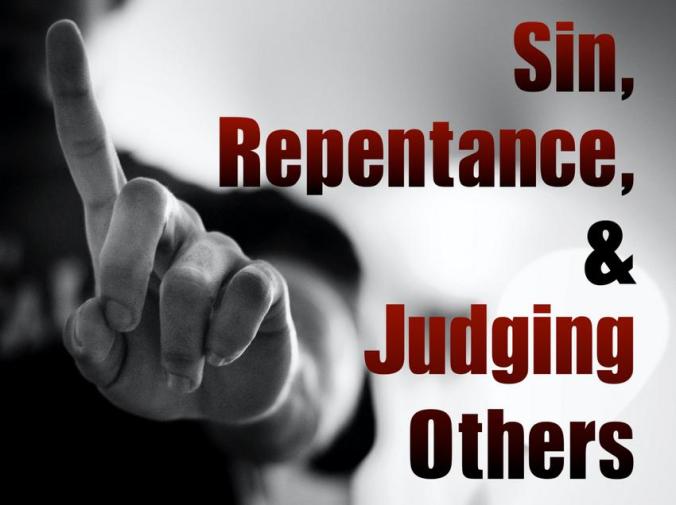“Go therefore and make disciples of all the nations…teaching them to observe all that I commanded you; and lo, I am with you always, even to the end of the age” (Matthew 28:19-20, NASB).
——————–
Contents:
1) Sin, Repentance, and Judging Others (Doy Moyer)
2) God’s Perfect Law of Liberty (Mike Johnson)
3) “Almost” Is Not Enough! (Barney L. Keith)
——————–

-1-
Sin, Repentance, and Judging Others
Doy Moyer
Some discussions just seem odd to me. One such oddity goes along these lines (and it seems to happen over and over, especially on social media, so this is not a reference to one particular discussion):
Person A: “People who engage in this activity are in sin and need to repent.” (What the specific sin is differs from case to case, and it is irrelevant for this point.)
Person B responds: “We shouldn’t judge others because we are all sinners who need forgiveness.”
By this response, person B sweeps away the point made by person A because we all sin and we don’t want to be judgmental of others. Now it is true that we all need forgiveness, and it is doubtful that many will deny this; no one is claiming perfection here. However, that does not negate the fact that we still need to call attention to sin and the need to repent. Recognizing that we are all guilty of sin is not a reason to think, “Therefore we should never tell anyone else that they ought to repent.”
Consider the case of Isaiah, who, overwhelmed by God’s glory, confessed his own sinfulness and the sinfulness of those around him. Upon receiving forgiveness, he was then ready to go preach to stubborn people who wouldn’t listen to the message of repentance (Isa. 6). The point is that Isaiah did not refrain from preaching about sin and repentance based upon the fact that he himself needed forgiveness.
How do we know we are all sinners who need to repent unless someone first tells us about sin and God’s will for repentance (2 Pet. 3:9; Acts 17:30-31)? Shall we just assume everyone knows this before they are told? If we are all sinners who need to repent, then someone told us at some point, and this assumes an understanding of sin and repentance. Shall we not give others this same message at the risk of sounding too judgmental? Shall our fear of sounding judgmental overcome our need to love others enough to present God’s message to them? Are we showing real love if we ignore the sin, fail to point people toward repentance, and just embrace their situation no matter what? Is that the godly thing to do? Jesus didn’t die in order to silence the message of repentance. His death provides the hope that is attached to the message, and we need to be preaching it with clarity.
The gospel is about grace and forgiveness, but knowing about that grace only works when we first understand why we need grace and forgiveness. If we don’t know about the sin, we won’t know about our need to repent. If we don’t know of our need to repent, we won’t know we need grace and mercy. Again, how can someone say, “We shouldn’t judge” based on the fact that we are all sinners, unless that person first knows the problem of sin? If not careful, the “we shouldn’t judge” mantra can become a mask that veils the fullness of the gospel.
We are not being self-righteously judgmental by expressing what God has said about sin and repentance; we are being true to His word. Our message is not, “You need to repent and I never have to.” We are all indeed in the same boat. We can show the problem of sin while recognizing our own guilt and need for God. We can do this with humility and grace. We can speak the truth in love (Eph. 4:15). Calling out sin and the need to repent is not automatically unloving and self-righteous, and we must not assume that one who calls attention to sin is being some kind of prudish, holier-than-thou hypocrite. (We could point out that Person B is, in fact, judging person A for the perceived sin of being judgmental, with the implication that he ought to repent and quit being judgmental. Is that ironically unloving and judgmental?)
Paul knew of his own sins, but that didn’t stop him from rebuking Peter (Gal. 2). Peter surely was aware of his own weaknesses, but that didn’t stop him from rebuking Simon (Acts 8). Both Paul and Peter repented of sins, but they still told others what was necessary.
Show love. Show grace. Show kindness. But don’t, for a moment, think that these are in contradiction to calling out sin for what it is and pointing people to God’s message of repentance. Yet while doing this, let’s never stop short of sharing the answer to the problem — the blood of Jesus through which we find grace and forgiveness. Repentance is not an end in itself; salvation is the goal. Our purpose in calling out sin and showing the need to repent is not to condemn, but to point the way to that relationship with Christ in which there is “no condemnation” (Rom. 8:1-2).
“Therefore repent and return, so that your sins may be wiped away, in order that times of refreshing may come from the presence of the Lord…” (Acts 3:19).
— Via Mind Your Faith, May 25, 2016
——————–

-2-
God’s Perfect Law of Liberty
Mike Johnson
James 1:25 says, “But he who looks into the perfect law of liberty and continues in it, and is not a forgetful hearer but a doer of the work, this one will be blessed in what he does.” This verse reveals some important points about God’s perfect law of liberty. Those who obey this verse are put in contrast with the mere “hearers” of verse 22. Consider what is said in this passage about the perfect law of liberty.
1. It must be LOOKED INTO. This is not speaking of a casual look or a glance at the Word of God. The word in the Greek means “to gaze carefully by the side of, to peer into or to peep into” (Robertson’s Word Pictures). It is the same word used in John 20:5 where John is described as looking into the empty tomb of Christ. The NASB translates it “looks intently.” It is important that we engage in a very serious study of God’s Word.
2. It is PERFECT. The word translated “perfect” means complete or full. This makes it clear that God’s law, the Bible, is God’s complete revelation for us today. It is all we need, and there is no need to use man-made creeds as guides. A number of passages speak of the finality and completeness of God’s revelation (Jude 3, II Tim. 3:16-17, Gal. 1:6-10, Rev. 22:18-19).
3. It is a LAW. Some say we are not under “law” today. It is true we are not under the Law of Moses, but a number of passages make it clear we are under a law. The Scriptures point out we are under the law of Christ (Gal. 6:2, I Cor. 9:21), the law of the Spirit and life (Rom. 8:2), and the law of love (Rom. 13:10).
4. It is a law of LIBERTY. The expression “law of liberty” may seem like a contradiction to some. But, true liberty can only exist where there is a law. Those who follow their own passions and desires are the “servants” of Satan (Rom. 6:16-17) as they yield to him. True freedom is in Christ. Jesus said, (Jn. 8:32) “And you shall know the truth, and the truth shall make you free.” Through Christ, we can be free from sin (Rom. 6:18).
5. It must be OBEYED. Our verse says we must “continue in” the perfect law of liberty. The NASB says, “abide by it.” The verse also says one must be a “doer of the work” (“doing it” — NIV). This section is speaking of obedience to God’s Word. Verse 22 says, “But be doers of the word, and not hearers only, deceiving yourselves.” I Corinthians 15:58 says we must be steadfast, unmovable, always abounding in the work of the Lord.
6. It will PRODUCE BLESSINGS. We are also told that the person who obeys these instructions “would be blessed in what he does.” How is this the case? First, obeying the perfect law of liberty produces happiness here upon this earth. Please note the following ways this can be seen. 1. Faithful Christians will generally make good choices in life which will result in greater happiness (Eph. 6:2-3). 2. Also, Christians can have a clear conscience. 3. Christians have a relationship with God which allows them to communicate with Him through prayer. 4. There are assurances regarding God providing the physical necessities of life (Mt. 6:33). Second, in a separate category, faithful Christians will receive the ultimate reward which is a home in heaven (Mt. 25:46). Psalm 19:11 points out that we are warned by God’s Law and then says, ” . . . And in keeping them there is great reward.”
HOW DO YOU REGARD GOD’S PERFECT LAW OF LIBERTY?
— via The Elon Challenger Vol. 13, No. 10, June 2016
——————–

-3-
“Almost” Is Not Enough!
Barney L. Keith
It is sometimes said of an individual who has not yet obeyed the gospel, “I believe he is almost ready to be baptized,” or that “she is close to becoming a Christian!”
Friend, are you one of those people? Can we not somehow impress upon you:
That “almost” is not sufficient to make one a Christian;
That being “close” is not the same thing as being “in Christ”;
That you are still in a LOST condition;
That Christ is coming in judgment one day?
It is essential for you to note the words of Paul in 2 Thessalonians 1:7-9 where he states that those “who do not obey the gospel … will pay the penalty of eternal destruction.” We URGE you to take a serious look at your life, your need of salvation, and the hope that can be found only “in Christ.” Obey the gospel TODAY!
— Via The Elon Challenger, Vol. XIII, No. 9, May 2016
——————–
The Steps That Lead to Eternal Salvation
1) Hear the gospel, for that is how faith comes (Rom. 10:17; John 20:30,31).
2) Believe in the deity of Christ (John 8:24; John 3:18).
3) Repent of sins (Luke 13:5; Acts 17:30).
4) Confess faith in Christ (Rom. 10:9,10; Acts 8:36-38).
5) Be baptized in water for the remission of sins (Mark 16:16; Acts 2:38; 22:16; Rom. 6:3,4; Gal. 3:26,27; 1 Pet. 3:21).
6) Continue in the faith, living for the Lord; for, if not, salvation can be lost (Heb. 10:36-39; Rev. 2:10; 2 Pet. 2:20-22).
——————–
Tebeau Street
CHURCH OF CHRIST
1402 Tebeau Street, Waycross, GA 31501
Sunday services: 9:00 AM (Bible class); 10 AM & 5 PM (worship)
Wednesday: 7 PM (Bible class)
evangelist/editor: Tom Edwards (912) 281-9917
Tom@ThomasTEdwards.com
http://thomastedwards.com/go (Older version of Gospel Observer website without pictures)
http://ThomasTEdwards.com/audioser.html (audio sermons)







